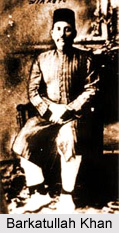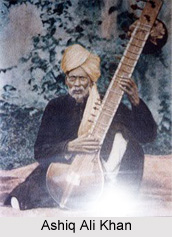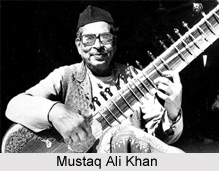 Jaipur, the Pink City of India, has produced several Senia musicians. Most of the musicians were the descendants of the Senia Beenkar Masid Khan and that is why the name "Senia Gharana" frequently appears. However, it is hard to find any instrumental gharana today which has no direct descendents from the Senia that is Miyan Tansen`s line. Many notable musicians are of the opinion that Jaipur Gharana was founded in the middle of the 18th century. Rohim Sen, who was the great-grandson of Masid Khan, lived in Jaipur in the 19th century. His son, Amrit Sen, was trained and guided by Ram Singh Maharaja. Amrit Sen had many disciples, like his son-in-law Nihal Sen, his nephew, Amir Khan, Sudarshan Acharya Shastri and Ustad Imdad Khan. Amir Khan contributed many of his years in Mohammed Shah darbar. One of the leading disciples of Amir Khan was Barkatulla Khan.
Jaipur, the Pink City of India, has produced several Senia musicians. Most of the musicians were the descendants of the Senia Beenkar Masid Khan and that is why the name "Senia Gharana" frequently appears. However, it is hard to find any instrumental gharana today which has no direct descendents from the Senia that is Miyan Tansen`s line. Many notable musicians are of the opinion that Jaipur Gharana was founded in the middle of the 18th century. Rohim Sen, who was the great-grandson of Masid Khan, lived in Jaipur in the 19th century. His son, Amrit Sen, was trained and guided by Ram Singh Maharaja. Amrit Sen had many disciples, like his son-in-law Nihal Sen, his nephew, Amir Khan, Sudarshan Acharya Shastri and Ustad Imdad Khan. Amir Khan contributed many of his years in Mohammed Shah darbar. One of the leading disciples of Amir Khan was Barkatulla Khan.
Barkatullah Khan
Barkatullah Khan had received his training from Amrit Sen, the famous Jaipur Senia sitar player and grandson of Maseet Sen. After arriving in Varanasi, Khan met Ashiq Ali and requested him to play his surbahar. Impressed by his demonstration, he invited Ashiq Ali to accompany him to Kathmandu where he was a favorite of the King. Ali agreed and so it was that his sitar instruction began. Ustad Barkatullah Khan did make one recording in l904 only.

Ashiq Ali Khan
Juggu Khan"s descendants all became musicians by birth. His great grandson Sadiq Ali Khan continued the tradition. However, he died early when his own son Ashiq Ali Khan was still a child. Sadiq Ali Khan"s cousin brother Waras Ali took the responsibility of training Ashiq Ali. Waras Ali Khan, a third generation descendant of Makku Khan, was an expert in dhrupad singing and veena paying. Waras Ali decided to teach Ashiq Ali Khan the surbahar, using the special right hand technique of the veena which requires the use of two plectrums.
Owing to his dedication, Ashiq Ali Khan became an extraordinary surbahar player. He started playing so well that kings and notable people would invite him to play surbahar for them. He would have only played surbahar had it not been for the timely arrival in Varanasi of the renowned sitar player from Mysore Ustad Barkatullah Khan. It is said that it was impossible for a listener to hold back tears when he played raga Bihag. One of the leading disciples of Ashiq Ali Khan was his own son, Mustaq Ali Khan.
Mustaq Ali Khan
 Mustaq Ali Khan started his training in sitar at the age of six under the guidance of his father, Ashiq Ali Khan. Within a short span of time, he learned the technique of sitar. At the age of twelve, he started his training in surbahar. Although the priority of Mushtaq Ali Khan was to learn sitar and surbahar, his father encouraged him to learn other traditional Indian music as well. Thus, he learned the dhrupad compositions as well as many khyals, tappas, and thumris and also took an extensive training in pakhawaj. He also gained knowledge in tabla playing.
Mustaq Ali Khan started his training in sitar at the age of six under the guidance of his father, Ashiq Ali Khan. Within a short span of time, he learned the technique of sitar. At the age of twelve, he started his training in surbahar. Although the priority of Mushtaq Ali Khan was to learn sitar and surbahar, his father encouraged him to learn other traditional Indian music as well. Thus, he learned the dhrupad compositions as well as many khyals, tappas, and thumris and also took an extensive training in pakhawaj. He also gained knowledge in tabla playing.
After a short stint at the court of Jaunpur in Uttar Pradesh, Mushtaq Ali Khan moved to Calcutta (now Kolkata) in l929. He became an instant success and started receiving invitations to play all over India. He was one of the first artists to play on All India Radio and continued to record for them until the very end of his life.
One of the notable disciples of Mustaq Ali Khan is Debu Chaudhuri. He served as the senior Sitar teacher of Delhi University until 2004, the year of his retirement.




















